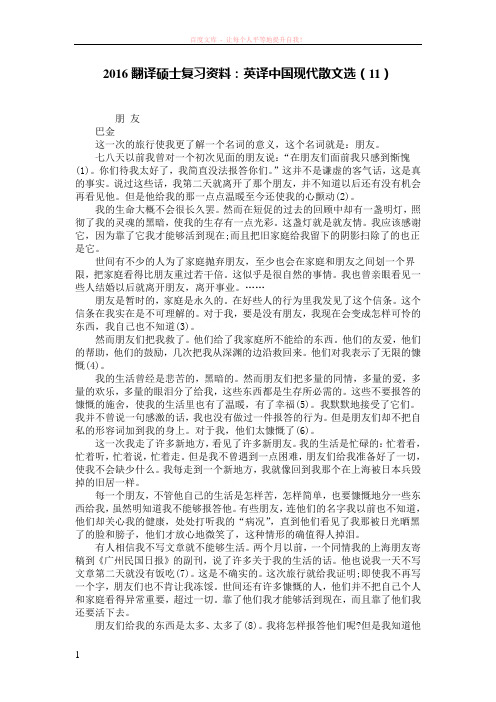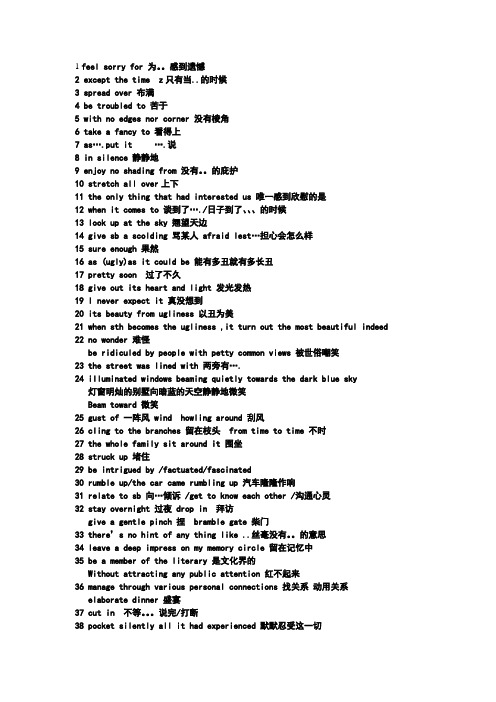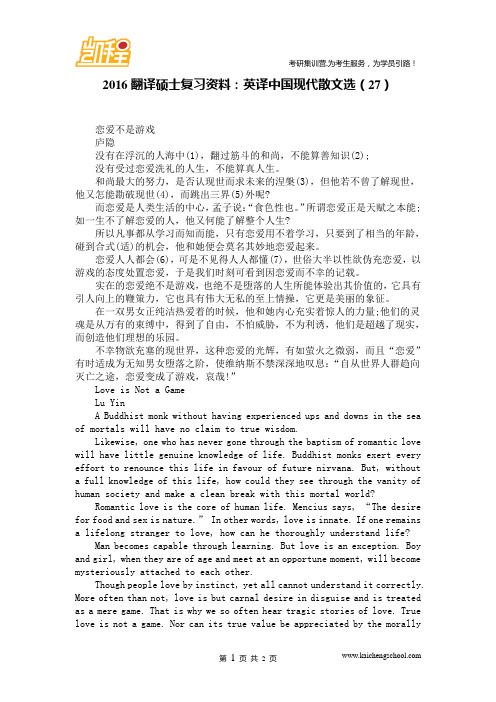翻硕复习资料中国现代散文汉译英
2016翻译硕士复习资料:英译中国现代散文选(11) (1)

2016翻译硕士复习资料:英译中国现代散文选(11)朋友巴金这一次的旅行使我更了解一个名词的意义,这个名词就是:朋友。
七八天以前我曾对一个初次见面的朋友说:“在朋友们面前我只感到惭愧(1)。
你们待我太好了,我简直没法报答你们。
”这并不是谦虚的客气话,这是真的事实。
说过这些话,我第二天就离开了那个朋友,并不知道以后还有没有机会再看见他。
但是他给我的那一点点温暖至今还使我的心颤动(2)。
我的生命大概不会很长久罢。
然而在短促的过去的回顾中却有一盏明灯,照彻了我的灵魂的黑暗,使我的生存有一点光彩。
这盏灯就是就友情。
我应该感谢它,因为靠了它我才能够活到现在;而且把旧家庭给我留下的阴影扫除了的也正是它。
世间有不少的人为了家庭抛弃朋友,至少也会在家庭和朋友之间划一个界限,把家庭看得比朋友重过若干倍。
这似乎是很自然的事情。
我也曾亲眼看见一些人结婚以后就离开朋友,离开事业。
……朋友是暂时的,家庭是永久的。
在好些人的行为里我发见了这个信条。
这个信条在我实在是不可理解的。
对于我,要是没有朋友,我现在会变成怎样可怜的东西,我自己也不知道(3)。
然而朋友们把我救了。
他们给了我家庭所不能给的东西。
他们的友爱,他们的帮助,他们的鼓励,几次把我从深渊的边沿救回来。
他们对我表示了无限的慷慨(4)。
我的生活曾经是悲苦的,黑暗的。
然而朋友们把多量的同情,多量的爱,多量的欢乐,多量的眼泪分了给我,这些东西都是生存所必需的。
这些不要报答的慷慨的施舍,使我的生活里也有了温暖,有了幸福(5)。
我默默地接受了它们。
我并不曾说一句感激的话,我也没有做过一件报答的行为。
但是朋友们却不把自私的形容词加到我的身上。
对于我,他们太慷慨了(6)。
这一次我走了许多新地方,看见了许多新朋友。
我的生活是忙碌的:忙着看,忙着听,忙着说,忙着走。
但是我不曾遇到一点困难,朋友们给我准备好了一切,使我不会缺少什么。
我每走到一个新地方,我就像回到我那个在上海被日本兵毁掉的旧居一样。
翻译硕士考研资料散文108语言要点

1 feel sorry for 为。
感到遗憾2 except the time z只有当..的时候3 spread over 布满4 be troubled to 苦于5 with no edges nor corner 没有棱角6 take a fancy to 看得上7 as….put it ….说8 in silence 静静地9 enjoy no shading from 没有。
的庇护10 stretch all over上下11 the only thing that had interested us 唯一感到欣慰的是12 when it comes to 谈到了…./日子到了、、、的时候13 look up at the sky 翘望天边14 give sb a scolding 骂某人 afraid lest…担心会怎么样15 sure enough 果然16 as (ugly)as it could be 能有多丑就有多长丑17 pretty soon 过了不久18 give out its heart and light 发光发热19 I never expect it 真没想到20 its beauty from ugliness 以丑为美21 when sth becomes the ugliness ,it turn out the most beautiful indeed22 no wonder 难怪be ridiculed by people with petty common views 被世俗嘲笑23 the street was lined with 两旁有….24 illuminated windows beaming quietly towards the dark blue sky灯窗明灿的别墅向暗蓝的天空静静地微笑Beam toward 微笑25 gust of 一阵风 wind howling around 刮风26 cling to the branches 留在枝头 from time to time 不时27 the whole family sit around it 围坐28 struck up 堵住29 be intrigued by /factuated/fascinated30 rumble up/the car came rumbling up 汽车隆隆作响31 relate to sb 向…倾诉 /get to know each other /沟通心灵32 stay overnight 过夜 drop in 拜访give a gentle pinch 捏 bramble gate 柴门33 there’s no hint of any thing like ..丝毫没有。
2016翻译硕士复习资料:散文翻译

2016翻译硕士复习资料:散文翻译(2)《水浒》的开篇:纷纷五代乱离间,一旦云开复见天! 草木百年新雨露,车书万里旧江山。
寻常巷陌陈罗绮,几处楼台奏管弦。
天下太平无事日,莺花无限日高眠。
After Five Dynasties’ turmoil and strife,The clouds dispersed and revealed the sky,Refreshing rain brought old trees new life,Culture and learning once again were high.Ordinary folk in the lanes wore silk,Music drifted from mansions and towers,Under the heavens all was serene,Men dozed off at noon midst gay birds and flowers.但愿人长久,千里共婵娟。
We wish each other a long life so as to share the beauty of this graceful moonlight, even though miles apart.独在异乡为异客,每逢佳节倍思亲。
A lonely stranger in a strange land I am cast, I miss my family all the more on every festive day.大江东去,浪淘尽,千古风流人物。
The endless river eastward flows; with its huge waves are gone all those gallant heroes of bygone years.二人同心,其利断金。
If two people are of the same mind, their sharpness can cut through metal.富贵不能淫,贫贱不能移,威武不能曲,此之谓大丈夫。
2016翻译硕士复习资料:英译中国现代散文选(33)

2016翻译硕士复习资料:英译中国现代散文选(33)母亲的回忆朱德得到母亲去世的消息,我很悲痛。
我爱我母亲,特别是她勤劳一生,很多事情是值得我永远回忆的。
我家是佃农,祖籍广东韶关籍人,在“湖广填四川” (1)时迁移四川仪陇县马鞍场。
世代为地主耕种,家境是贫苦的(2),和我们来往的朋友也都是老老实实的贫苦农民。
母亲一共生了十三个儿女,因为家境贫穷,无法全部养活,只留下八个,以后再生下的被迫溺死了。
这在母亲心里是多么悲痛、悲哀和无可奈何的事啊!母亲把八个孩子一手养大成人。
可是她的时间大半给家务和耕种占去了,没法多照顾孩子,只好让孩子们在地里爬着。
母亲是个“好劳动” (3)。
从我能记忆时起,总是天不亮就起床。
全家二十口人,妇女轮班煮饭,轮到就煮一年。
母亲把饭煮了,还要种田种菜,喂猪养蚕,纺棉花。
因为她身材高大结实,还能挑水挑粪。
母亲这样地整日劳碌着,我们到四五岁时就很自然地在旁边帮她的忙,到八九岁时就不单能挑能背,还会种地了。
记得那时我从学堂回家,母亲总在灶上汗流满面地烧饭,我就悄悄把书本一放,挑水或放牛去了。
有的季节里,我上午读书下午种地,一到农忙便整月停在地里跟着母亲劳动。
这个时期母亲教给我许多生产知识。
佃农家庭的生活自然是很苦的。
可是由于母亲的聪明能干,却很舒服。
我们把桐子榨油来点灯。
吃的是豌豆饭,菜花,红薯饭,杂粮饭,把菜籽榨出的油放在饭里做调料,这种地主富人家看也不看的饭食,母亲却能做得使一家吃起来有滋味。
赶上丰年,才能缝上一些新衣服,衣服也是自己生产出来的。
母亲亲手纺出线,请人织成布,染了颜色,我们叫做“家织布”,有铜钱那样厚,一套衣服老大穿过了,老二老三接下来穿还穿不烂(4)。
劳动的家庭是有规律有组织的。
我的祖父是一个中国标本式的农民,到了八九十岁还非耕田不可,不耕田就会害病,直到临死前不久还在地里劳动。
祖母是家庭的组织者,一切生产事务由她管理分派。
每年除夕,分派好一年的工作以后,天还没亮,母亲就第一个起床烧火做饭去了,接着听见祖父起来的声音,接着大家都离开床铺,喂猪的喂养猪,砍柴的砍柴,挑水的挑水。
2016翻译硕士复习资料:英译中国现代散文选(27)

2016翻译硕士复习资料:英译中国现代散文选(27)恋爱不是游戏庐隐没有在浮沉的人海中(1),翻过筋斗的和尚,不能算善知识(2);没有受过恋爱洗礼的人生,不能算真人生。
和尚最大的努力,是否认现世而求未来的涅槃(3),但他若不曾了解现世,他又怎能勘破现世(4),而跳出三界(5)外呢?而恋爱是人类生活的中心,孟子说:“食色性也。
”所谓恋爱正是天赋之本能;如一生不了解恋爱的人,他又何能了解整个人生?所以凡事都从学习而知而能,只有恋爱用不着学习,只要到了相当的年龄,碰到合式(适)的机会,他和她便会莫名其妙地恋爱起来。
恋爱人人都会(6),可是不见得人人都懂(7),世俗大半以性欲伪充恋爱,以游戏的态度处置恋爱,于是我们时刻可看到因恋爱而不幸的记载。
实在的恋爱绝不是游戏,也绝不是堕落的人生所能体验出其价值的,它具有引人向上的鞭策力,它也具有伟大无私的至上情操,它更是美丽的象征。
在一双男女正纯洁热爱着的时候,他和她内心充实着惊人的力量;他们的灵魂是从万有的束缚中,得到了自由,不怕威胁,不为利诱,他们是超越了现实,而创造他们理想的乐园。
不幸物欲充塞的现世界,这种恋爱的光辉,有如萤火之微弱,而且“恋爱”有时适成为无知男女堕落之阶,使维纳斯不禁深深地叹息:“自从世界人群趋向灭亡之途,恋爱变成了游戏,哀哉!”Love is Not a GameLu YinA Buddhist monk without having experienced ups and downs in the sea of mortals will have no claim to true wisdom.Likewise, one who has never gone through the baptism of romantic love will have little genuine knowledge of life. Buddhist monks exert every effort to renounce this life in favour of future nirvana. But, without a full knowledge of this life, how could they see through the vanity of human society and make a clean break with this mortal world?Romantic love is the core of human life. Mencius says, “The desire for food and sex is nature.” In other words, love is innate. If one remains a lifelong stranger to love, how can he thoroughly understand life?Man becomes capable through learning. But love is an exception. Boy and girl, when they are of age and meet at an opportune moment, will become mysteriously attached to each other.Though people love by instinct, yet all cannot understand it correctly. More often than not, love is but carnal desire in disguise and is treated as a mere game. That is why we so often hear tragic stories of love. True love is not a game. Nor can its true value be appreciated by the morallydegenerate.True love spurs one on to higher attainment. It embodies the supreme quality of selflessness, and is, above all, symbolic of beauty.When a man and woman are deeply immersed in true love, they are full of amazing inner strength. Their souls are freed from all bondage. They are unyielding before threats and incorruptible before any promise of material gain. They transcend the reality to create an ideal paradise of their own.Unfortunately, in this present world overflowing with material desires, this kind of true love is as rare as the feeble light of fireflies. What is more, “love” sometimes even leads to moral degeneration on the part of ignorant men and women. Over this, Venus cannot help lamenting with a deep sigh, “Love has become a mere game ever since humanity set out on its way to extinction. O what a sad story!”注释:女作家庐隐(1898-1934),福建闽侯人,早期与冰心齐名。
翻译硕士复习资料英译中国现代散文

翻译硕士复习资料英译中国现代散文时间即生命梁实秋 最令人怵目惊心的一件事,是看着钟表上的秒针一下一下的移动,每移动一下就是表示我们的寿命已经缩短了一部分。
再看看墙上挂着的可以一张张撕下的日历,每天撕下一张就是表示我们寿命又缩短了一天,因为时间即生命,没有人不爱惜他的生命,但很少人珍视他时间。
如果想在有生之年做一点什么事,学一点什么学问,充实自己,帮助别人,使生命成为有意义,不虚此生,那么就不可浪费光阴。
这道理人人都懂(1),可是很少人真能积极不懈的善为利用他的时间。
我自己就是浪费了很多时间的一个人(2)。
我不打麻将,我不经常的听戏看电影,几年中难得一次,我不长时间看电视,通常只看半个小时,我也不串门子闲聊天。
有人问我:“那么你大部分时间都做了些什么呢?”我痛自反省,我发现,除了职务上的必须及人情上所不能免的活动外,我的时间大部分都浪费了。
我应该集中精力,读我所未读过的书,我应该利用所有时间,写我所要写的东西。
但是我没能这样做。
我的好多时间都糊里糊涂的混过去了,“少壮不努力,老大徒伤悲。
” 例如我翻译莎士比亚,本来计划于课余之暇每年翻译两部,二十年即可完成,但是我用了三十年,主要的原因是懒。
翻译之所以完成,主要的是因为活得相当长久,十分惊险(3)。
翻译完成之后,虽然仍有工作计划,但体力渐衰,有力不从心之感(4)。
假使年轻的时候鞭策自己,如今当有较好或较多的表现。
然而悔之晚矣。
再例如,作为一个中国人,经书不可不读。
我年三十才知道读书自修的重要(5)。
我披阅,我圈点。
但是恒心不足,时作时辍。
五十以学易,可以无大过矣(6),我如今年过八十,还没有接触过《易经》,说来惭愧。
史书也很重要。
我出国留学的时候,我父亲买了一套同文石印的前四史(7),塞满了我的行箧的一半空间,我在外国混了几年之后又把前四史原封带回来了。
直到四十年后才鼓起勇气读了《通鉴》(8)一遍。
现在我要读的书太多,深感时间有限。
无论做什么事,健康的身体是基本条件。
翻硕英译中国现代散文选

翻硕英译中国现代散文选落花生 我们屋后有半亩隙地。
母亲说:“让它荒芜着怪可惜,既然你们那么爱吃花生,就辟来做花生园罢(1)。
”我们几个姊弟(2)和几个小丫头都很喜欢——买种的买种,动土的动土,灌园的灌园;过了不几个月,居然收获了! 妈妈说:“今晚我们可以做一个收获节(3),也请你们的爹爹来尝尝我们底新花生,如何?”我们都答应了。
母亲把花生做成好几样食品(4),还吩咐这节期要在园里底茅亭举行。
那晚上底天色不大好(5),可是爹爹也来到,实在很难得!爹爹说:“你们爱吃花生吗?” 我们都争着答应:“爱!” “谁能把花生底好处说出来?” 姊姊说:“花生的气味很美。
” 哥哥说:“花生可以榨油。
” 我说:“无论何等人都可以用贱价买它来吃;都喜欢吃它。
这是它的好处。
” 爹爹说:“花生底用处固然很多;但有一样是很可贵的。
这小小的豆(6)不像那好看的苹果、桃子、石榴,把它们底果实悬在枝上,鲜红嫩绿的颜色(7),令人一望而发生羡慕的心。
它只把果子埋在地底,等到成熟,才容人把它挖出来。
你们偶然看见一棵花生瑟缩(8)地长在地上,不能立刻辨出它有没有果实,非得等到你接触它才能知道。
” 我们都说:“是的。
”母亲也点点头。
爹爹接下去说:“所以你们要像花生(9),因为它是有用的,不是伟大、好看的东西。
”我说:“那么,人要做有用的,不要做伟大、体面的人了。
”爹爹说:“这是我对于你们的希望。
” 我们谈到夜阑才散,所有花生食品虽然没有了,然而父亲底话现在还印在我心版上。
PeanutsXu Dishan Behind our house there lay half a mou of vacant land. Mother said, “it’s a pity to let it lie waste. Since you all like to eat peanuts so very much, why not plant some here?” that exhilarated us children and our servant girls as well, and soon we started buying seeds, ploughing the land and watering the plants. We gathered in a good harvest just after a couple of months! Mother said, “How about giving a party this evening to celebrate the harvest and inviting your Daddy to have a taste of our newly-harvested peanuts?” We all agreed. Mother made quite a few varieties of goodies out of the peanuts, and told us that the party would be held in the thatched pavilion on the peanut plot. It looked like rain that evening, yet, to our great joy, father came nevertheless. “Do you like peanuts?” asked father. “Yes, we do!” we vied in giving the answer. “Which of you could name the good things in peanuts?” “Peanuts taste good,” said my elder sister. “Peanuts produce edible oil,” said my elder brother. “Peanuts are so cheap,” said I, “that anyone can afford to eat them. Peanuts are everyone’s favourite. That’s why we call peanuts good.” “It’s true that peanuts have many uses,” said father, “but they’re most beloved in one respect. Unlike nice-looking apples, peaches and pomegranates, which hang their fruit on branches and win people’s admiration with their brilliant colours, tiny little peanuts bury themselves underground and remain unearthed until they’re ripe. When you come upon a peanut plant lying curled up on the ground, you can never immediately tell whether or not it bear any nuts until you touch them.” “That’s true,” we said in unison. Mother also nodded. “So you must take after peanuts,” father continued, “because they’re useful though not great and nice- looking.” “Then you mean one should be useful rather than great andnice-looking,” I said. “That’s what I expect of you,” father concluded. We kept chatting until the party broke up late at night. Today, though nothing is left of the goodies made of peanuts, father’s words remain engraved in my mind. 注释: 本文是许地山(1892-1941)的名篇。
19翻译硕士复习资料:英译汉散文(1)

2019翻译硕士复习资料:英译汉散文(1)在MTI的命题考试中,有的院校偏爱政治时事类的,而有的学校则是偏爱于名著散文类的,所以对于不同的院校,在复习的时候侧重点也是不一样的,凯程陈老师给大家准备了一篇散文的中英双语,供大家备考使用。
艰难的国运与雄健的国民历史的道路,不会是坦平的,有时走到艰难险阻的境界。
这是全靠雄健的精神才能冲过去的(1)。
一条浩浩荡荡的长江大河,有时流到很宽阔的境界(2),平原无际,一泻万里(3)。
有时流到很逼狭的境界,两岸丛山迭岭,绝壁断崖,江河流于期间,回环曲折,极其险峻(4)。
民族生命的进展,其经历亦复如是。
人类在历史上的生活正如旅行一样。
旅途上的征人(5)所经过的地方,有时是坦荡平原,有时是崎岖险路(6)。
志于旅途的人,走到平坦的地方,因是高高兴兴地向前走,走到崎岖的境界,俞是奇趣横生(7),觉得在此奇绝壮绝(8)的境界,俞能感到一种冒险的美趣(9)。
中华民族现在所逢的史路,是一段崎岖险阻的道路。
在这段道路上,实在亦有一种奇绝壮绝的境至,使我们经过此段道路的人,感得一种壮美的趣味,是非有雄健的精神的,不能够感觉到的。
我们的扬子江、黄河,可以代表我们的民族精神,扬子江及黄河遇见沙漠、遇见山峡都是浩浩荡荡的往前流过去,以成其浊流滚滚,一泻万里的魄势(10)。
目前的艰难境界,那能阻抑我们民族生命的前进。
我们应该拿出雄健的精神,高唱着进行的曲调,在这悲壮歌声中,走过这崎岖险阻的道路。
要知(11)在艰难的国运中建造国家,亦是人生最有趣味的事……。
National Crisis vs Heroic NationThe course of history is never smooth.It is sometimes beset with difficulties and obstacles and nothing short of a heroic spirit can help surmount them.A mighty long river sometimes flows through a broad section with plains lying boundless on either side,its waters rolling on non-stop for thousands upon thousands of miles.Sometimes it comes up against a narrow section flanked by high mountains and steep cliffs,winding through a course with many a perilous twist and turn.A nation,in the course of its development,fares likewise.The historical course of man’s life is just like a journey.A traveler on a long journey passes through now a broad,level plain,now a rugged, hazardous road.While a determined traveler cheerfully continues his journey upon reaching a safe and smooth place,he finds it still more fascinating to come to a rugged place,the enormously magnificent spectacle of which,he feels,is better able to generate in him a wonderful sensation of adventure.The Chinese nation is now confronted with a rugged and dangerous section of its historical course.Nevertheless,there is also in this section a spectacle of enormous magnificence that inspires in uspassers-by a delightful sensation of splendor.And this delightful sensation,however,can only be shared by those with a heroic spirit.The Yangtse River and the Yellow River are both symbolic of our national spirit the two mighty rivers negotiate deserts and gorges until their turbid torrents surge forward with irresistible force.The present national crisis can never obstruct the advance of our national life.Let us brace up our spirits and march through this rugged,dangerous road to the tune of our solemn,stirring songs.The greatest joy of life,mind you,is to build up our country during its most difficult days.注释:李大钊此文载于1923年12月20日《新国民》第一卷第2号上,短小隽永,堪称一首诗意盎然的抒情散文诗。
- 1、下载文档前请自行甄别文档内容的完整性,平台不提供额外的编辑、内容补充、找答案等附加服务。
- 2、"仅部分预览"的文档,不可在线预览部分如存在完整性等问题,可反馈申请退款(可完整预览的文档不适用该条件!)。
- 3、如文档侵犯您的权益,请联系客服反馈,我们会尽快为您处理(人工客服工作时间:9:00-18:30)。
翻硕复习资料中国现代散文汉译英许多院校在考试的试卷上都喜欢出一些中国比较经典的现在范文片段,然后让学生进行汉译英的翻译,所以凯程老师整理了经典的现代散文翻译供大家参考,同时在文章后面对于个别字词进行了解析,帮助同学们弄懂文章的意思。
祖父和灯火管制(1)冰心 一九一一年秋,我们从山东烟台回到福州老家去。
在还乡的路上,母亲和父亲一再嘱咐我(2),“回到福州住在大家庭里,不能再像野孩子(3)似的,一切都要小心。
对长辈们不能没大没小的。
祖父是一家之主,尤其要尊敬……” 到了福州,在大家庭里住了下来,我觉得我在归途中的担心是多余的。
祖父、伯父母、叔父母(4)和堂姐妹兄弟(5),都没有把我当作野孩子,大家也都很亲昵平等,并没有什么“规矩”。
我还觉得我们这个大家庭是几个小家庭的很松散的组合(6)。
每个小家庭都是各住各个的,各吃各的,各自有自己的亲戚朋友,比如说,我们就各自有自己的“外婆家(7)”! 就在这一年,也许是第二年吧,福州有了电灯公司。
我们这所大房子里也安上了电灯,这在福州也是一件新鲜事,我们这班孩子跟着安装的工人们满房子跑,非常地兴奋欢喜!我记得这电灯是从房顶上吊下来的,每间屋子都有一盏,厅堂上和客室里的五十支光,卧房里的光小一些,厨房里的就更小了。
我们这所大房子里至少也五六十盏灯,第一夜亮起来时,真是灯火辉煌,我们孩子们都拍手欢呼! 但是总电门是安在祖父的屋里的。
祖父起得很早也睡得很早(8),每晚九点钟就上床了。
他上床之前,就把电闸关上,于是整个大家庭就是黑沉沉的一片! 我们刚回老家(9),父母亲和他们的兄弟妯娌(10)都有许多别情要叙,我们一班弟兄姐妹,也在一起玩得正起劲(11),都很少在晚九点以前睡的。
为了防备(12)这骤然的黑暗,于是每晚在九点以前,每个小家庭都在一两间屋里,点上一盏捻得很暗的煤油灯。
一到九点,电灯一下子都灭了,这几盏煤油灯便都捻亮了,大家相视而笑,又都在灯下谈笑玩耍。
只有在这个时候,我才体会到我们这个大家庭是一个整体,而祖父是一家之主!Grandpa and Nightly BlackoutBing Xin In the autumn of 1911, we returned from Yantai of Shandong Province to our native place Fuzhou. While on the way, my parents warned me again and again, “Since we’ll be living in a big family in Fuzhou, remember always to behave properly and never act like a naughty child. Show respect for your elders, particularly your grandpa, who is head of the family…” After settling down in the big family in Fuzhou, however, I found that my previous worries on the way turned out to be unfounded. My grandpa, uncles, aunties and cousins never thought me a naughty child. We treated each other lovingly and equally. There never existed anything like “family rules of good behaviour”. I also found that the big family was a loose community of several smaller ones, which lived and ate separately. They each had their own relatives and friends, for example, their ownin-laws. That year, or the year after, Fuzhou began to have its own power company and electric lights were to be installed in our big house too. That was something new in our home town. We kids, wild with excitement and joy, ran here and there in the house at the heels of the electricians. Each room, I remember, had an electric lamp hanging from the ceiling. The drawing room had a 50-watt bulb; the bedrooms each a lower-wattage one; the kitchens each an even-lower-wattage one. The whole big house at least had a total of some 60 electric lamps. The first evening when they were turn on, the whole house was suddenly ablaze with lights, we kids clapped with joy. The master switch was fixed in grandpa’s room. Grandpa, who kept early hours, would switch off all the lights when he went to bed at 9 o’clock in the evening, thus plunging the whole big house into deep darkness. Having just set foot in our old home, we seldom slept before 9 o’clock in the evening. For it was but natural that after the long separation, my parents enjoyed hearty chats about the old days with their brothers and in-laws, and we kids of the younger generation played about together to our heart’s content. Hence, in anticipation of the sudden blackout at 9 o’clock, each small family would get a dimly-lit kerosene lamp ready in a couple of their rooms. No sooner had the big house been blacked out on the hour than we turned up the wicks of all the kerosene lamps. And, looking and smiling at each other, we would continue to chat and play merrily by the light of the kerosene lamps. It was then that I realized what a complete whole our big family was, with grandpa as its head. 注释: 本文写于1982年7月22日,是冰心回忆故乡和童年的一篇深情佳作。
文章娓娓述来,形象地再现了童年时代家乡生活片断。
(1)“灯火管制”本指战时防空停电,作者用它指每夜定时关灯,有些俏皮。
译文结合文章内容增添Nightly一词。
在英语中,blackout一词既可指“战时灯火管制”,也可一般的“停电”,译文所指是后者。
又blackout也可换用power cut或power failure等。
(2)“一再地嘱咐我”意即“一再地告诫我”,译为warned me again and again,比enjoined (或exhorted) me again and again通俗。
(3)“野孩子”不宜按字面直译为wild child。
现译为naughty child,其中naughty常用来指孩子“不听话”。
(4)“伯父母、叔父母”在英语以uncles和aunties两词概括即可。
(5)“堂姐妹兄弟”在英语以cousins一词概括即可。
(6)“几个小家庭的很松散的组合”译为a loose community of several smaller ones,其中不妨以community代替combination;community为近代英语所常用。
(7)“外婆家”指由婚姻而结成的亲戚,如岳父母、妻子的兄弟姐妹等等,现以in-laws一词概括之。
(8)“起得很早也睡得很早”在英语有现成的表达:kept early hours。
如逐字直译为got up early and went to bed early似欠简洁。
(9)“刚回老家”译为Having set foot in our old home,其中set foot in 是成语,作“进入”、“踏上”解。
(10)“妯娌”指兄弟的妻子,以in-laws表达即可。
(11)“正起劲”意同“尽情地”,故译to our heart’s content。
(12)“防备”译为in anticipation of,意即“预计到……(而采取措施)”。
